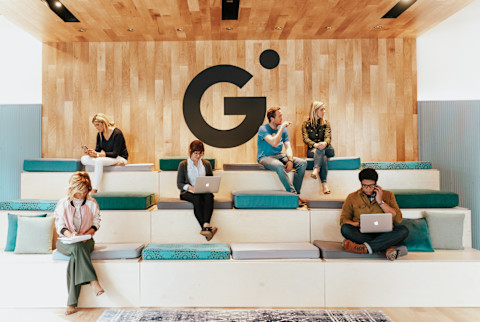
Gravity—a new project in Columbus, Ohio—is the latest addition to a $134 billion wellness real estate market. A collection of residences, office space, and retail spotted with colorful art, outdoor courtyards, and plenty of open space for gathering, it seeks to redefine what "community" can really mean.
"The whole thing is curated on improving mental health and the human experience," Brett Kaufman, the ex-banker behind the utopia tells mbg. The residential apartments, which opened to the public earlier this month at a similar price point to other downtown Columbus real estate, are nearly 40% full.

In an age when loneliness has been dubbed an epidemic, more and more physical spaces seek to foster meaningful connections as a kind of antidote. Take Serenbe, a network of neighborhoods outside of Atlanta where front porches are required and front garages are banned—all in the name of getting the conversation going.
"All of our houses are closer to the street and closer to each other. That way, when neighbors are walking out at the same time, they'll see each other," COO Garnie Nygren told mbg in 2018. "The front of our houses are required to be 70% covered with a front porch, and none of them can have front garages. If a garage is on the front of the house, you need a driveway off the street and it cuts off the sidewalk. It tells you that a car is more important than a person."
Beyond making sure that there are plenty of opportunities to interact, Gravity also puts its mental health services front row center. Kaufman says that this decision was in part inspired by his own experience going to see therapists.
"I used to drive to my therapist's office in this crummy part of town, and I'd walk into his old office building, and it would bum me out from the start," he says. "At Gravity, we started a new business called Innerspace, which is essentially coworking for therapists."
At Innerspace, practitioners can work and mingle in common areas as patients receive treatment in private rooms. "You walk in and feel immediately uplifted. The one administering the work feels better, and the one doing the work feels better." Kaufman hopes that by putting services like these right in the middle of the community, there will be less of a stigma around using them: "People can go get therapy like you might go work out."
Gravity will also host events that speak to its emphasis on mental and physical health. Think workshops on Transcendental Meditation and networking as an introvert as well as your standard yoga and exercise classes—many of which are open to the public.
"If you live in Los Angeles or New York or maybe Austin, you have access to things that might feel basic: Yoga studios, good food, green juice are on every corner. It's not here. And yet there’s enormous demand. People want it just as bad,” he says.
Meaningful friendships, nutritious food, lots of movement, and access to the right doctors can make for a happier, healthier person. In our book, the more communities building these things into their design, the better.
